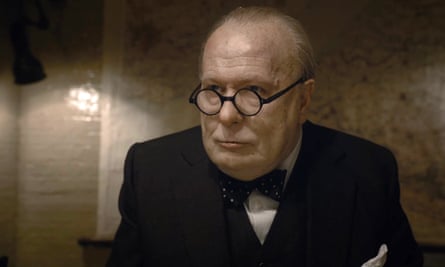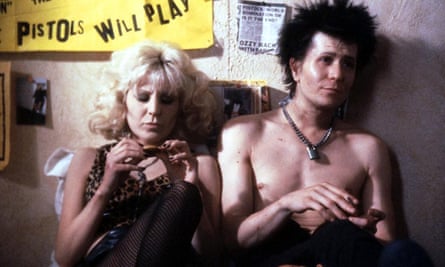There is no blue plaque on Hatcham Park Road, London SE14. The fact that Gary Oldman grew up on this tight run of what were once two-up-two-downs behind New Cross Gate station is officially unrecognised. The closest thing to a tribute around his former patch of south-east London is the continued presence of the Five Bells at the top of the road, the pub where his alcoholic father used to drink.
Maybe an Oscar will change that. Thirty-five years into his strange, lurching career, Oldman is now the star of Darkest Hour, in which he plays Winston Churchill, facing down Hitler and appeasers alike in the grim pinch of 1940. Under much latex, it is at once a performance of breathtaking subtlety and huge, juicy GIFs in waiting. In other words, it is very Gary Oldman. And it has made him favourite at miserly odds to win an Oscar for best actor.
A backlash may yet arise. On Sunday night, as Oldman received a Golden Globe wearing a Time’s Up badge, social media recalled accusations of violence against his ex-wife Donya Fiorentino – always denied, and for which he was never charged – and queasy 2014 comments about Mel Gibson’s exile from a Hollywood “run by Jews”, that led to public apologies. Still, this particular Oscar has the feel of a done deal, to double as a lifetime achievement award.
What may not be obvious to US audiences is the irony of Oldman playing Churchill at all – the aristocratic scion of Blenheim Palace, scourge of the striking miners of Tonypandy, portrayed by the son of a welder whose first job on leaving school at 16 was in a Peckham sports shop. An optimist might even take it as a sign of a country on the brink of classlessness.

An optimist would be wrong. The timing of Oldman’s moment is noteworthy. Last November, the cross-party Social Mobility Commission released its latest State of the Nation report. “There is a stark social mobility lottery in Britain today,” it read. “The country seems to be in the grip of a self-reinforcing spiral of ever-growing division.” A week after publication, blaming inertia among ministers, the entire commission resigned.
For British actors, ever-growing division is a fact of life. The erection of roadblocks for working-class actors now begins at state schools, where drama has been squeezed out by slashed teaching budgets and a narrowing curriculum. Then come rising fees at drama schools. Overcome those and you get to chase dwindling roles in soaps and bad gangster movies. There has been no lack of protest – among others, Maxine Peake and Hayley Squires have talked publicly about the pincer movement of austerity and cultural indifference. Less clear is who in British film is listening.
Oldman may not have much advice. What public mention he has ever made of class suggests he sees it as small print. Perhaps he said what he had to say with his only film as a director, the scalding semi-autobiographical Nil By Mouth. All that was just the first instalment of his life, he told me when I interviewed him a few years ago. “Just one book in the library of Gary.”
But not even Gary came out of nowhere. In fact, his career took flight from a specific moment in British life – a different time for actors without unfair advantages. He was born in 1958, during a golden age of British social mobility, when at least some working-class children were ushered towards the newly open doors of universities and the professions. The class system was in flux, and the proof was on our movie screens. British film suddenly brimmed with new faces from northern backstreets and iffy bits of London: Albert Finney and Michael Caine, Shirley Anne Field and Tom Courtenay. As a boy, Oldman was too skittish for academic success – it didn’t matter. As he took his first steps as an actor years later, that original class shakeup was still felt throughout British culture; it was in David Bowie and 2 Tone, and the double dose of Bob Hoskins in Pennies from Heaven and The Long Good Friday.
For a New Cross likely lad, it meant there were chances. Parts in which to hone his extraordinary presence. Some of what made Oldman special was his daring. In an early 80s blighted by Aids panic, he didn’t care about the sexuality of his roles, and played a married bisexual in the sweet-natured We Think the World of You and playwright Joe Orton in Prick Up Your Ears. As well as stealing scenes, he had a genius for finding truths to his characters that other actors might not even know were there – the lost-soul pathos beneath the idiot junkie in Sid and Nancy; the stunted nothing at the heart of football hooligan Bex in The Firm.

But crucially, the culture allowed him to do it, his breakthrough coming at a time when a working-class actor was trusted to transcend cliches and carry a movie. Still, that he would leave for Hollywood felt inevitable, a born performer drawn towards the biggest stage. Inevitable too that he would stay there, far from Hatcham Park Road under warm blue skies, settling into a groove of bespoke supporting turns in blockbuster franchises. He came back to Britain mostly to film his recurring role in the Harry Potter series. Otherwise he had ascended to the status of eternal Transatlantic expat, beyond England, beyond class.
The picture is complicated only by Nil By Mouth, the knuckle-hard portrait of a south-east London family he made in 1997. His own history was all over it – Oldman even shot his characters drinking themselves stupid in the Five Bells. Twenty years later, it remains one of the greatest films in all British cinema. Wincingly real, it explained why he might not want his identity tied up with his past, even as it made sure it always would be.
But the interest of British film in working class actors was fading. Heirs to Oldman were scarce. At the turn of the millennium there was Samantha Morton, another lightning strike talent from a life without contacts or middle-class home comforts, so brilliant even Hollywood took note. Around the same time, a charismatic male lead from Hackney via Canning Town was moving to New York, tired of soaps and bit parts. Eventually, Britain would have a bona fide star in Idris Elba – unlike Oldman, he first had to become one in America. To be black and working-class in Britain was a double height hurdle.
And now? Across and alongside faultlines of race and gender, the old evils of access, accent and money still define careers – and lives. The current crisis is often framed in terms of the well-bred chaps who now dominate starring roles – as if the most important thing about stifled working class talent was the chance for middle class journalists to have a go at Benedict Cumberbatch.In fact, less interesting than who might play Joe Orton in 2018 is the simple fact that it wouldn’t be a kid like Gary Oldman.
The electric Oldman of the 80s and 90s was a role model for all kinds of people, whether he meant to be or not. (Actor-writer Johnny Harris traces his whole career back to seeing Nil By Mouth as a drifting ex-boxer; Stephen Graham, the son of a nurse, studied acting at Rose Bruford College in Sidcup purely because Oldman went there.)
But that legacy is unravelling, the line of influence thinning into non-existence. In 1958, actors were the vanguard of British social mobility – now they symbolise its breakdown. The point is not that the next Gary Oldman might be working at Sports Direct. The point is he or she could be there forever. And they will win no Oscars, because unlike Oldman, they will have to know their place.
